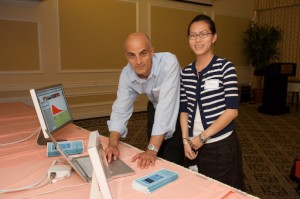
2008 Brian P. Copenhaver Award Reception for Innovation in Teaching with Technology, UCLA, Los Angeles, CA.
A wide variety of education institutions, including a number of those studied in Our Peers, are developing funding initiatives for faculty development, particularly when it comes to teaching with technology. Often funded via private donation, some of the most promising examples include grants and awards for innovative undergraduate education, faculty fellowships within instructional technology units, and internal “venture” funding. Many of these examples have the benefit of public endorsement from the school’s governing board, president, provost, or other campus leaders.
Grants and Awards for Innovative Undergraduate Education
Public honor and support for technology-enhanced undergraduate education is a feature at a growing number of educational institutions, including those with a residential or regional mission. What distinguishes the programs below is not just the financial incentive for faculty, but the public-facing nature of the awards, which can inspire others on campus to innovate themselves.
UCLA
While it is no longer an active program, UCLA’s Office of Instructional Development has in the past awarded the Brian P. Copenhaver Award for Innovation in Teaching with Technology. Funded for a seven-year cycle through a dedicated gift, the award honored UCLA faculty who made innovative use of technology specifically to improve undergraduate instruction. Nominees were solicited from across the university annually, and multiple awards were given each year. The winning faculty were drawn from a diverse array of academic departments. Each gave a video interview about the pedagogical work for which they were nominated; a repository of innovation and inspiration that remains valuable to this day.
Washington State
The Office of the Vice Provost for Undergraduate Education at Washington State University awards Smith Teaching and Learning Grants to a number of local faculty each year. The endowment, established by alumni and friends on behalf of a retiring president, awards grants to those faculty that “create new ways to educate students” or present “innovative ideas to enhance teaching and learning” at the institution. While not limited to technological innovation, many of the grants awarded go to projects with a technological component.
Faculty Fellowships
Several institutions have instituted faculty fellowship programs within their educational technology units, providing varied models of financial support that allow the institution to cultivate those faculty with an interest in teaching with technology into local leaders.
University of Tennessee
At the University of Tennessee, the Office of Information Technology (OIT) has implemented a Faculty Fellow Program, with 1 or 2 faculty serving in this role each academic year. The fellows implement projects that enhance the use of instructional technology in their local academic departments, and promote OIT’s services to campus. For ten hours per week of service, the faculty fellow receives a course release each semester, or a combination of one course release and a travel and research grant equivalent to a second course release. Funding for this program is provided by OIT.
University of Washington
At the University of Washington, the Office of the Provost and the Center for Teaching and Learning currently collaborate to offer a Technology Teaching Fellows program, a two-part funded experience for faculty that is made possible through private donation. Selected faculty attend a weeklong summer institute, during which they redesign a traditional course into a hybrid or online format, and then teach the redesigned course during the academic year. Support from staff and graduate students is available throughout the process. Faculty must meet one final requirement—a reflection on the experience, given at a local symposium or presented in digital format—in order to receive their entire stipend.
Internal “Venture” Funding
The University of Michigan’s Office of Digital Education and Innovation provides “seed money” for innovative digital education pilots that enhance U-M’s residential education mission. This funding—a mix of central resources, support funds from academic units, and gifts solicited from donors—supports digital course development, innovative instructional design, research on digital education, and the development of new technological tools for faculty.
